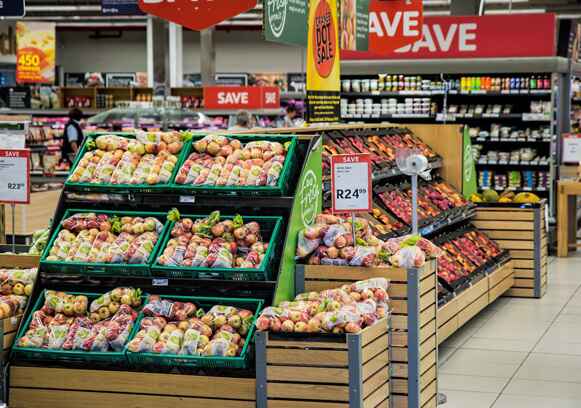
10 Most Important Retail Technologies For Small Retail Business

This article will guide you through the 10 most important retail technologies that every small retailer should consider implementing. Whether you're just starting out or looking to level up your existing operations, these tech tools will help you optimize efficiency, boost sales, and create a memorable shopping experience for your customers.
Establish Your Business and Determine Your Niche
Starting a small retail business can be an exciting and rewarding venture. However, before diving headfirst into the world of retail, it's crucial to establish your business and determine your niche. This will help you lay a solid foundation for success.
The first step is to find your target market. Understanding who your customers are and what they want is essential for tailoring your products or services to their needs. Conduct market research, analyze consumer trends, and identify any gaps in the market that you can fill with your unique offerings.
Once you have a clear understanding of your target market, it's time to develop a unique selling proposition (USP). This is what sets you apart from competitors and gives customers a reason to choose you over others. Identify what makes your business special - whether it's exceptional customer service, high-quality products, or innovative solutions - and emphasize that in all aspects of your branding.
Creating a comprehensive business plan is another critical aspect of establishing your retail business. A well-thought-out plan will outline every aspect of operations, including finances, marketing strategies, staffing requirements, and growth projections. It serves as a roadmap for achieving success while minimizing risks along the way.
In addition to these foundational steps, don't forget about legal considerations such as registering your business name and obtaining necessary licenses or permits. Taking care of these administrative tasks early on will ensure smooth sailing as you move forward with building out the infrastructure of your small retail business.
By investing time in establishing your business and determining its niche at the outset, you're setting yourself up for long-term success in the competitive world of retail. So take this first step seriously - it'll make all the difference down the line!
1. Find Your Target Market
Finding your target market is a crucial step in establishing a successful retail business. Understanding who your customers are and what they want is the key to effectively marketing your products or services. Here are some tips to help you find and connect with your target market.
First, do thorough research to identify the demographics and characteristics of your ideal customers. Consider factors such as age, gender, location, income level, and interests. This information will help you tailor your marketing strategies to reach the right audience.
Next, analyze the competition in your industry. Look at who their customers are and how they position themselves in the market. This can give you insights into potential gaps or opportunities that you can capitalize on.
Once you have identified your target market, it's important to engage with them directly to understand their needs and preferences. Conduct surveys or interviews to gather feedback on existing products or ideas for new ones. This will help you refine your offerings and stay ahead of competitors.
Furthermore, leverage social media platforms and online communities where your target market spends time. Engage with them by sharing relevant content, responding promptly to inquiries or comments, and offering exclusive promotions or discounts.
Continuously monitor trends and changes within your target market. Consumer preferences evolve over time; staying up-to-date ensures that you can adapt accordingly and continue meeting their needs effectively.
By finding your target market early on in the process of establishing a small retail business, you set yourself up for success by tailoring all aspects of operations towards meeting their specific needs and desires.
2. Develop a Unique Selling Proposition
Developing a Unique Selling Proposition (USP) is essential for any small retail business to stand out in today's competitive market. Your USP is what sets you apart from your competitors and appeals to your target customers. It communicates the unique value that you offer, making it easier for customers to choose your products or services over others.
To develop a compelling USP, start by identifying your core strengths and what makes your business special. What do you do better than anyone else? Is it exceptional customer service, high-quality products, or innovative solutions? Focus on these aspects and highlight them in your USP.
Next, think about the needs and desires of your target market. What problems are they facing? How can you solve those problems better than anyone else? Tailor your USP to address these pain points directly so that customers see the immediate benefit of choosing your business.
Consider incorporating emotional triggers into your USP as well. Emotions play a significant role in purchasing decisions, so tap into them by highlighting how using your product or service will make customers feel - whether it's confident, inspired, or satisfied.
Remember to keep it concise and memorable. Craft a clear and straightforward statement that captures the essence of what makes you unique. Avoid vague statements; instead, be specific about how you provide value that no one else can match.
Test and refine! Ask for feedback from trusted sources like loyal customers or industry professionals. Continuously tweak and improve until you have a powerful USP that resonates with both existing and potential customers alike!
Developing a strong Unique Selling Proposition is just one step towards establishing yourself as an unforgettable brand within the retail industry!
3. Create a Business Plan
Creating a solid business plan is an essential step for any small retail business. It serves as the roadmap to success, laying out your goals and strategies for achieving them. Here are some key points to consider when creating your business plan.
First, clearly identify your customers. Who are your ideal customers? What are their needs and preferences? Understanding your customers will help you tailor your products and services to meet their demands effectively.
Next, develop a unique selling proposition (USP) that sets you apart from competitors. What makes your retail business special? Whether it's offering personalized customer service or stocking niche products, identifying your USP will give you a competitive edge in the market.
In addition to these elements, include detailed financial projections in your business plan. How much revenue do you expect to generate each month? How much will it cost to run and grow your retail business? Being realistic about finances can help you make informed decisions and avoid potential pitfalls.
Furthermore, outline marketing strategies that will enable you to reach and engage with customers effectively. Consider both online and offline advertising methods such as social media campaigns or local events participation. Effective marketing tactics can help increase brand awareness and drive sales.
Regularly review and update your business plan as needed. The retail industry is dynamic, so staying adaptable is crucial for long-term success. By continuously evaluating performance metrics against goals outlined in the plan, you can make adjustments accordingly.
Remember that creating a comprehensive business plan takes time but is well worth the effort in ensuring the success of your small retail venture!
4. Point of Sale (POS) System
A point of sale (POS) system is an essential technology for any small retail business. It is the central hub where all sales transactions take place, making it a crucial component in managing and tracking your business's financials. With a modern POS system, you can streamline your operations, improve customer service, and gain valuable insights into your business.
First and foremost, a POS system allows you to process transactions quickly and efficiently. Gone are the days of manually calculating totals or dealing with outdated cash registers. With just a few clicks, you can ring up items, apply discounts or promotions, and accept various payment methods - whether it's credit cards, mobile payments like Apple Pay or Google Wallet, or even contactless options like NFC.
But a good POS system does much more than just process payments. It also helps you manage inventory effectively by automatically updating stock levels whenever a sale is made. This real-time visibility into your inventory prevents overselling or running out of popular products unexpectedly.
Additionally, many modern POS systems offer robust reporting features that provide insights into sales trends and customer behavior. You can generate reports on top-selling products, peak sales periods, average transaction values - essentially any data point that can help inform your decision-making processes.
Another advantage of using a POS system is its integration capabilities with other retail technologies such as e-commerce platforms or CRM systems. By connecting these different tools together seamlessly through integrations or APIs (Application Programming Interfaces), you create an interconnected ecosystem that simplifies operations across multiple channels.
Finally - albeit not exhaustively - most reputable POS systems come with built-in security features to protect against fraud and unauthorized access to sensitive customer information. Encryption protocols ensure that data transmitted during transactions remains secure while user permissions allow you to control who has access to certain functions within the system.
Investing in the right point of sale (POS) system will undoubtedly enhance the way you run your small retail business. From streamlining sales transactions to gaining valuable insights and improving security, a modern POS system is an indispensable tool
5. Inventory Management Software
Inventory management is a crucial aspect of running a small retail business. Keeping track of your products, monitoring stock levels, and ensuring timely replenishment are all essential for smooth operations. That's where inventory management software comes in handy.
1. Streamline your inventory processes: With the right software, you can automate various tasks related to managing your inventory. From tracking stock levels to generating purchase orders and receiving notifications when items run low, this technology simplifies the entire process.
2. Real-time visibility: Inventory management software provides real-time visibility into your stock levels across multiple locations or channels. This allows you to make informed decisions about restocking or transferring products based on demand patterns and sales trends.
3. Reduce manual errors: Manual tracking of inventory increases the chances of human error, leading to discrepancies between physical counts and recorded quantities. By automating these processes with software, you can minimize errors and ensure accurate data.
4. Optimize ordering: One key feature of inventory management software is its ability to generate automatic reorder points based on predefined thresholds or historical sales data. This ensures that you never run out of popular items while avoiding overstocking less desirable products.
5.Improve customer satisfaction: By having an efficient system in place that accurately tracks your inventory, you can better fulfill customer orders without delays or backorders. This helps improve customer satisfaction by ensuring they receive their desired products promptly.
Investing in robust inventory management software for your small retail business can provide numerous benefits such as streamlining processes, reducing errors, and improving overall efficiency.
Automating tasks, such as tracking stock levels, reordering, and optimizing order fulfillment adds value not only to internal operations but also enhances the customer experience.
With real-time visibility into product availability, you can make informed decisions regarding stocking, purchasing, replenishing and meeting fluctuating demand patterns.
Inventory management systems are essential tools that optimize backend operations, enabling businesses like yours to focus on growth, strategy delivering excellent customer service.
6. Customer Relationship Management (CRM) System
A Customer Relationship Management (CRM) system is a crucial retail technology that can help small businesses streamline their customer interactions and improve overall customer satisfaction. With a CRM system in place, you can effectively manage your customer data, track their buying behaviors, and personalize your marketing efforts.
First and foremost, a CRM system allows you to centralize all your customer information in one place. This means no more digging through spreadsheets or sifting through stacks of paper to find important details about your customers. Everything from contact information to purchase history can be easily accessed with just a few clicks.
Additionally, a CRM system enables you to track and analyze customer behavior patterns. By understanding what products or services they prefer, how often they make purchases, or even their preferred communication channels, you can tailor your marketing strategies accordingly. This personalized approach not only increases the chances of repeat business but also enhances the overall shopping experience for each individual customer.
Furthermore, a CRM system facilitates effective communication with customers across various channels. You can set up automated email campaigns to send personalized offers based on past purchases or engage with customers directly through social media platforms. These targeted communications help build stronger relationships with customers by providing them with relevant content and promotions that resonate with their needs and preferences.
Moreover, integrating a CRM system into your retail operations allows for better collaboration among team members. Sales representatives can access real-time information on customer interactions and provide seamless service regardless of who is assisting the client at any given time. This ensures consistency in communication while eliminating duplication of efforts within the organization.
Leveraging analytics provided by CRM systems helps measure the effectiveness of marketing campaigns and identify areas for improvement. By analyzing key metrics such as conversion rates or response rates from different campaigns, small retailers can refine their strategies over time and allocate resources more efficiently.
In conclusion: A robust Customer Relationship Management (CRM) System is an essential tool for small retailers looking to enhance their customer interactions and optimize marketing efforts. With a CRM system, businesses can centralize customer data, track buying behaviors,
7. E-commerce Platform
When it comes to running a small retail business, having an e-commerce platform is essential in today's digital age. With the rise of online shopping, having an online presence can significantly boost your sales and expand your customer base. Here are some key reasons why investing in an e-commerce platform is crucial for your success.
Initially, an e-commerce platform allows you to reach a wider audience beyond your physical store location. It opens up opportunities for customers from all over the world to discover and purchase your products or services. By breaking down geographical barriers, you can tap into new markets and increase your revenue potential.
Then, having an e-commerce platform provides convenience for both you and your customers. Your customers can browse through your products at any time of day or night without needing to visit a physical store. This flexibility enhances their shopping experience and increases their likelihood of making a purchase. For you as a retailer, managing online orders is streamlined with automated processes that save time and effort.
Also, an e-commerce platform enables you to showcase product details more effectively compared to traditional brick-and-mortar stores. You can include high-quality images, detailed descriptions, customer reviews, and even videos that help potential buyers make informed decisions about their purchases. This level of transparency builds trust with customers and boosts conversion rates.
Moreover, integrating features such as personalized recommendations based on browsing history or previous purchases can enhance the overall shopping experience on your e-commerce platform. By leveraging data analytics tools integrated into these platforms, you gain valuable insights into customer preferences and behaviors which allow for targeted marketing strategies.
Last but not least, security measures provided by reputable e-commerce platforms protect both yours'and your customers' sensitive information during transactions - building trust in online purchasing process essential component creating long-lasting relationships with clients
Investing in an e-commerce platform has become imperative for small retail businesses looking to thrive in today's digital world. It offers expanded reach, convenience, enhanced product showcasing, personalized experiences
8. Mobile Payment Solutions
In today's fast-paced world, convenience is key. And when it comes to payment options, customers are increasingly looking for ways to make transactions quickly and easily. That's where mobile payment solutions come in.1. Simplifying the checkout process: With mobile payment solutions, customers can simply tap their smartphones or smartwatches on a compatible device to complete their purchase. No more fumbling for cash or digging out credit cards - just a quick and seamless transaction that saves time for both the customer and the retailer.
2. Expanding your customer base: By offering mobile payment options, you open up your business to a whole new demographic of tech-savvy consumers who prefer using their smartphones for everything from shopping to banking. This means you can attract more customers and potentially increase sales.
3. Enhancing security measures: Mobile payment solutions often come with advanced security features such as encryption technology and tokenization, which help protect sensitive customer data during transactions. This gives both you and your customers peace of mind knowing that their personal information is safe from hackers or identity theft.
4. Improving efficiency: Mobile payments can streamline your operations by reducing the need for manual cash handling or credit card processing machines. This not only saves time but also minimizes human error, ensuring accurate record-keeping and better inventory management.
5. Staying ahead of the competition: As technology continues to evolve, businesses need to stay updated with the latest trends in order to remain competitive in the market. Offering mobile payment solutions shows that you are forward-thinking and willing to adapt to changing consumer preferences - qualities that can set you apart from other retailers in your industry.
With all these benefits in mind, it's clear why integrating mobile payment solutions into your small retail business is essential in today's digital age.
9. Analytics and Data Tracking Tools
In the digital world of today, data is king. And as a small retail business owner, harnessing the power of analytics and data tracking tools can be a game-changer for your success. These tools provide valuable insights into customer behavior, purchase patterns, and overall business performance.
With analytics and data tracking tools, you can track key metrics such as sales revenue, customer acquisition costs, conversion rates, and more. This information allows you to make informed decisions about pricing strategies, marketing campaigns, inventory management, and even store layout optimization.
By analyzing customer data through these tools, you can better understand your target audience's preferences and tailor your offerings accordingly. For example, if you notice that certain products are selling well during specific seasons or events based on past purchasing trends - this knowledge can help inform future product development or promotional efforts.
Additionally, these tools enable you to monitor website traffic sources and user behavior on your e-commerce platform. Understanding how customers navigate through your online store can highlight areas for improvement in terms of user experience or identify potential barriers to conversion.
Furthermore, analytics platforms often offer real-time reporting capabilities that allow you to track sales performance throughout the day or week - giving you immediate visibility into what's working well versus what may need adjustment.
Ultimately, investing in analytics and data tracking tools empowers small retail businesses to make data-driven decisions rather than relying solely on gut instincts or guesswork.
Fashioning yourself as an analytical retailer will position you ahead of competitors who are not leveraging technology's benefits. So don't overlook the importance of these powerful tools when it comes to growing your small retail business!
10. Security Systems and Fraud Protection
When running a small retail business, one of the most important aspects to consider is security and fraud protection. With increasing online threats and an ever-changing landscape of cybercrime, implementing robust security systems is crucial for safeguarding your store's sensitive information and protecting your customers' data.
Investing in a comprehensive security system can provide peace of mind knowing that you have taken necessary steps to protect your business. This includes installing surveillance cameras, burglar alarms, and access control systems. These technologies act as deterrents against theft and vandalism while also providing evidence in case of any untoward incidents.
In addition to physical security measures, it is essential to implement cybersecurity protocols such as firewalls, antivirus software, and encryption tools. These will help protect your computer networks from unauthorized access or malicious attacks that could compromise sensitive customer information like credit card details.
Another significant aspect of fraud protection is ensuring secure payment processing systems. Implementing EMV chip-enabled card readers can help prevent fraudulent transactions by authenticating each transaction with a unique code generated by the chip embedded in the customer's payment card.
Moreover, staying up-to-date with the latest trends in cybersecurity is vital for small businesses. Regularly monitoring network activity using intrusion detection systems can detect unusual patterns or suspicious behavior that may indicate an ongoing attack or attempted breach.
By prioritizing security systems and fraud protection measures within your retail business operations, you are not only safeguarding yourself but also building trust among your customers who feel confident in their purchases from you. Remember that investing time and resources into these technologies now will pay off exponentially in the long run by preventing potential losses due to theft or compromised data.
Implement and Optimize Your Retail Technologies
Now that you have established your business and chosen the right retail technologies, it's time to take the next step: implementing and optimizing these technologies. This crucial step ensures that your small retail business can effectively utilize these tools to enhance operations, improve customer experience, and drive growth.
Start by integrating your point of sale (POS) system into your daily processes. Train your staff on how to use it efficiently, ensuring smooth transactions with accurate tracking of sales data. This will not only streamline your checkout process but also provide valuable insights into customer behavior and inventory management.
Make sure you fully utilize your inventory management software. Regularly update stock levels, track product performance, and set up automated reordering processes to avoid stockouts or overstocking. By optimizing this technology, you can maintain a balanced inventory that meets customer demand while minimizing costs.
Leverage the power of a customer relationship management (CRM) system to build strong relationships with your customers. Use CRM tools to gather information about their preferences and purchasing behaviors. This knowledge enables personalized marketing campaigns tailored specifically for each individual customer segment.
Next, take advantage of an e-commerce platform to expand beyond brick-and-mortar boundaries. Set up an online store where customers can conveniently browse products and make purchases anytime from anywhere in the world. An e-commerce presence opens up new revenue streams for your business while catering to changing consumer shopping habits.
Invest in analytics and data tracking tools that enable you to monitor key performance metrics such as sales trends, website traffic sources, and conversion rates.
This data-driven approach helps identify areas for improvement, making informed decisions and maximizing overall efficiency across various aspects of your business operation
Implementing and optimizing retail technologies is an ongoing process.
You'll need to stay updated with the latest features of each tool and continuously adaptto changing shopping trends and customer expectations.
Invest time and in resources into training and research to successfully integrate and optimize your chosen technologies for long-term business success.
Conclusion
In today's competitive retail landscape, small businesses need to leverage the power of technology to stay ahead. By implementing the right retail technologies, you can streamline your operations, enhance customer experiences, and drive growth.
Start by establishing your business and determining your niche. Understand who your target market is and develop a unique selling proposition that sets you apart from competitors. Create a comprehensive business plan that outlines your goals and strategies for success.
Next, choose the right retail technologies that will support your business objectives. Invest in a reliable point of sale (POS) system to handle transactions efficiently. Utilize inventory management software to optimize stock levels and reduce wastage. Implement a customer relationship management (CRM) system to build strong relationships with customers and improve loyalty.
To reach a wider audience, set up an e-commerce platform where customers can browse and purchase products online. Incorporate mobile payment solutions for convenient transactions on-the-go. Use analytics and data tracking tools to gain insights into consumer behavior and make informed business decisions.
Prioritize security systems and fraud protection measures to safeguard sensitive customer information.
Once you have implemented these technologies, it's important to continually optimize them for maximum effectiveness. Stay updated on new advancements in retail technology so that you can adapt as needed.
Remember, while technology is essential for small retailers' success, it should always be used strategically based on the specific needs of your business.
By embracing these 10 most important retail technologies for small retail businesses, you'll be equipped with the tools necessary to thrive in today's ever-evolving marketplace!
So go ahead - harness the power of technology - transform your small retail business into a forceful contender!
 THE BUSINESS WEB ARTICLE DIRECTORY
THE BUSINESS WEB ARTICLE DIRECTORY



